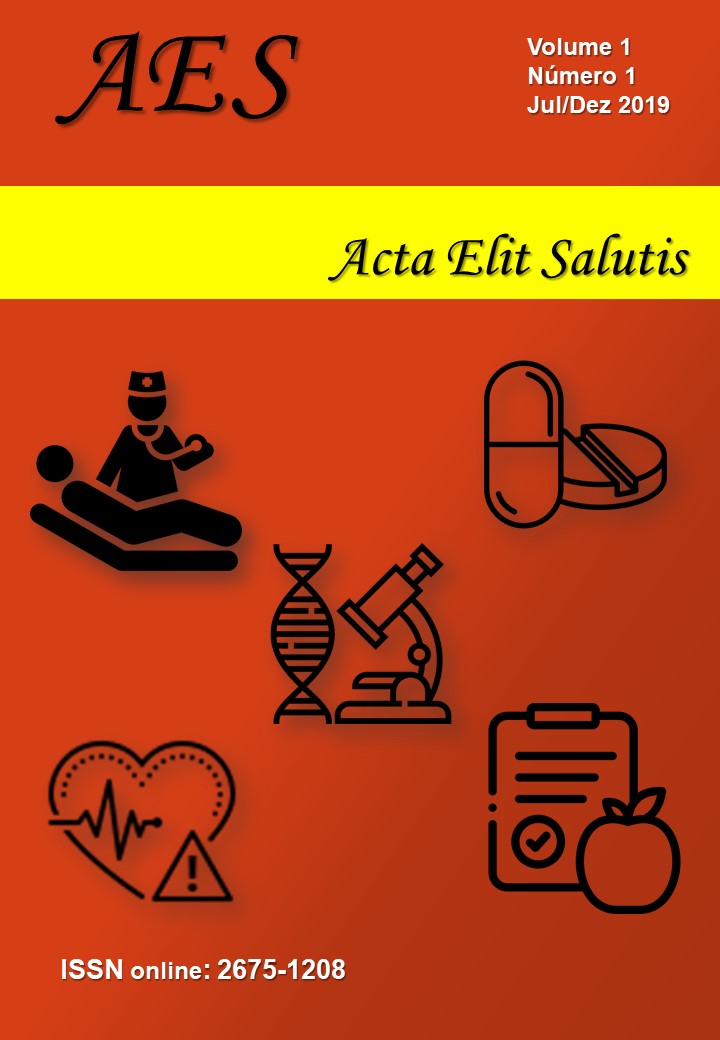Prevalência de suplementação de vitamina B12 em vegetarianos da universidade regional de Blumenau (FURB)
DOI:
https://doi.org/10.48075/aes.v1i1.23742Palavras-chave:
Vitamina, Vitamina B12, Vegetariano, Suplementação, FURBResumo
A dieta vegetariana está se tornando mais comum no mundo. No Brasil cerca de 14% da população é vegetariana, representando cerca de 30 milhões de pessoas, segundo a Sociedade Vegetariana Brasileira. O objetivo do trabalho é avaliar a prevalência da suplementação de vitamina B12 em vegetarianos da Universidade Regional de Blumenau (FURB). É possível observar que 75% dos participantes da pesquisa fazem acompanhamento com exames bioquímicos, o que é muito importante para avaliar a necessidade de suplementação. Em relação aos sintomas, 35% não apresentam sintomas, fato este que pode estar associado ao curto período de dieta, menos de 3 anos. Já que a vitamina B12 possui estoque hepático. Concluiu-se que a suplementação de vitamina B12, apesar de ser necessária não é amplamente adotada pelos vegetarianos analisados neste estudo, sendo suplementada por metade dos participantes.
Referências
-KRAJCOVICOVA-KUDLACKOVA M, et al. Traditional and alternative nutrition--levels of homocysteine and lipid parameters in adults. Scand J Clin Lab Invest. Pubmed [Internet]. 2000 Dec [cited 2018 Jun 15]; 60(8):657-64. Avaliable from: https://www.ncbi.nlm.nih.gov/pubmed/11218148 doi: 10.1080/00365510050216385
-MIRANDA D, et al. Qualidade nutricional de dietas e estado nutricional de vegetarianos. Demetra Alimentação, Nutrição e Saúde. E-publicacoes [Internet]. 2013 [cite 2018 Jun 16]; 8(2):163-172. Avaliabe from:
https://www.e-publicacoes.uerj.br/index.php/demetra/article/view/4773/5167
-MORALEJO SC. Nutrição no atleta vegetariano [dissertação]. Porto: Universidade Fernando Pessoa; 2014.
-RIBEIRO LS, et al. Dieta vegetariana: o que falta saber sobre o papel do selénio na proteção contra doenças? Concurso de Mérito acadêmico do Centro Vegetariano, Portugal, pg. 1-2, 2010.
-SABATÉ J. The contribution of vegetarian diets to health and disease: a paradigm shift? Am J Clin Nutr. 2003;78 Suppl 3:502S-507S.
-SLYWITCH E. Alimentação sem carne: Um guia prático para montar sua dieta vegetariana com saúde. Segunda edição. Alaúde, p. 141, 2015.
-SLYWITCH E. Guia alimentar de dietas vegetarianas para adultos. Sociedade Vegetariana Brasileira; 2012.
-SVB.ORG. Pesquisa do IBOPE aponta crescimento histórico no número de vegetarianos no Brasil. 2018. Sociedade Vegetariana Brasileira. [acesso 23 jul. 2018] Disponível em: https://www.svb.org.br/2469-pesquisa-do-ibope-aponta-crescimento-historico-no-numero-de-vegetarianos-no-brasil
-VITOLO M. Nutrição da gestação ao envelhecimento. Rubio: Rio de Janeiro; 2015.
Downloads
Publicado
Como Citar
Edição
Seção
Licença
Copyright (c) 2019 Acta Elit Salutis

Este trabalho está licenciado sob uma licença Creative Commons Attribution-NonCommercial-ShareAlike 4.0 International License.
Aviso de Direito Autoral Creative Commons
Política para Periódicos de Acesso Livre
Autores que publicam nesta revista concordam com os seguintes termos:
1. Autores mantém os direitos autorais e concedem à revista o direito de primeira publicação, com o trabalho simultaneamente licenciado sob a Licença Creative Commons Attribution que permite o compartilhamento do trabalho com reconhecimento da autoria e publicação inicial nesta revista.2. Autores têm autorização para assumir contratos adicionais separadamente, para distribuição não-exclusiva da versão do trabalho publicada nesta revista (ex.: publicar em repositório institucional ou como capítulo de livro), com reconhecimento de autoria e publicação inicial nesta revista.
3. Autores têm permissão e são estimulados a publicar e distribuir seu trabalho online (ex.: em repositórios institucionais ou na sua página pessoal) a qualquer ponto antes ou durante o processo editorial, já que isso pode gerar alterações produtivas, bem como aumentar o impacto e a citação do trabalho publicado (Veja O Efeito do Acesso Livre).
Licença Creative Commons
Esta obra está licenciada com uma Licença Creative Commons Atribuição-NãoComercial-CompartilhaIgual 4.0 Internacional, o que permite compartilhar, copiar, distribuir, exibir, reproduzir, a totalidade ou partes desde que não tenha objetivo comercial e sejam citados os autores e a fonte.





